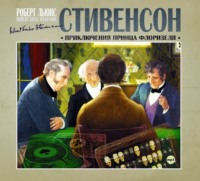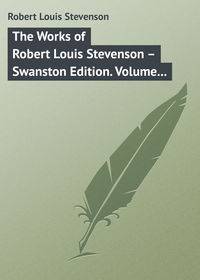 полная версия
полная версияThe Works of Robert Louis Stevenson – Swanston Edition. Volume 16
The name of Soutar has twice escaped my pen, and I feel I owe him a vignette. Soutar first attracted notice as mate of a praam at the Bell Rock, and rose gradually to be captain of the Regent. He was active, admirably skilled in his trade, and a man incapable of fear. Once, in London, he fell among a gang of confidence-men, naturally deceived by his rusticity and his prodigious accent. They plied him with drink – a hopeless enterprise, for Soutar could not be made drunk; they proposed cards, and Soutar would not play. At last, one of them, regarding him with a formidable countenance, inquired if he were not frightened? “I’m no’ very easy fleyed,” replied the captain. And the rooks withdrew after some easier pigeon. So many perils shared, and the partial familiarity of so many voyages, had given this man a stronghold in my grandfather’s estimation; and there is no doubt but he had the art to court and please him with much hypocritical skill. He usually dined on Sundays in the cabin. He used to come down daily after dinner for a glass of port or whisky, often in his full rig of sou’-wester, oilskins, and long boots; and I have often heard it described how insinuatingly he carried himself on these appearances, artfully combining the extreme of deference with a blunt and seamanlike demeanour. My father and uncles, with the devilish penetration of the boy, were far from being deceived; and my father, indeed, was favoured with an object-lesson not to be mistaken. He had crept one rainy night into an apple-barrel on deck, and from this place of ambush overheard Soutar and a comrade conversing in their oilskins. The smooth sycophant of the cabin had wholly disappeared, and the boy listened with wonder to a vulgar and truculent ruffian. Of Soutar, I may say tantum vidi, having met him in the Leith docks now more than thirty years ago, when he abounded in the praises of my grandfather, encouraged me (in the most admirable manner) to pursue his footprints, and left impressed for ever on my memory the image of his own Bardolphian nose. He died not long after.
The engineer was not only exposed to the hazards of the sea; he must often ford his way by land to remote and scarce accessible places, beyond reach of the mail or the post-chaise, beyond even the tracery of the bridle-path, and guided by natives across bog and heather. Up to 1807 my grandfather seems to have travelled much on horseback; but he then gave up the idea – “such,” he writes with characteristic emphasis and capital letters, “is the Plague of Baiting.” He was a good pedestrian; at the age of fifty-eight I find him covering seventeen miles over the moors of the Mackay country in less than seven hours, and that is not bad travelling for a scramble. The piece of country traversed was already a familiar track, being that between Loch Eriboll and Cape Wrath; and I think I can scarce do better than reproduce from the diary some traits of his first visit. The tender lay in Loch Eriboll; by five in the morning they sat down to breakfast on board; by six they were ashore – my grandfather, Mr. Slight an assistant, and Soutar of the jolly nose, and had been taken in charge by two young gentlemen of the neighbourhood and a pair of gillies. About noon they reached the Kyle of Durness and passed the ferry. By half-past three they were at Cape Wrath – not yet known by the emphatic abbreviation of “The Cape” – and beheld upon all sides of them unfrequented shores, an expanse of desert moor, and the high-piled Western Ocean. The site of the tower was chosen. Perhaps it is by inheritance of blood, but I know few things more inspiriting than this location of a lighthouse in a designated space of heather and air, through which the sea-birds are still flying. By 9 p.m. the return journey had brought them again to the shores of the Kyle. The night was dirty, and as the sea was high and the ferry-boat small, Soutar and Mr. Stevenson were left on the far side, while the rest of the party embarked and were received into the darkness. They made, in fact, a safe though an alarming passage; but the ferryman refused to repeat the adventure; and my grandfather and the captain long paced the beach, impatient for their turn to pass, and tormented with rising anxiety as to the fate of their companions. At length they sought the shelter of a shepherd’s house. “We had miserable up-putting,” the diary continues, “and on both sides of the ferry much anxiety of mind. Our beds were clean straw, and but for the circumstance of the boat, I should have slept as soundly as ever I did after a walk through moss and mire of sixteen hours.”
To go round the lights, even to-day, is to visit past centuries. The tide of tourists that flows yearly in Scotland, vulgarising all where it approaches, is still defined by certain barriers. It will be long ere there is a hotel at Sumburgh or a hydropathic at Cape Wrath; it will be long ere any char-à-banc, laden with tourists, shall drive up to Barra Head or Monach, the Island of the Monks. They are farther from London than St. Petersburg, and except for the towers, sounding and shining all night with fog-bells and the radiance of the light-room, glittering by day with the trivial brightness of white paint, these island and moorland stations seem inaccessible to the civilisation of to-day, and even to the end of my grandfather’s career the isolation was far greater. There ran no post at all in the Long Island; from the lighthouse on Barra Head a boat must be sent for letters as far as Tobermory, between sixty and seventy miles of open sea; and the posts of Shetland, which had surprised Sir Walter Scott in 1814, were still unimproved in 1833, when my grandfather reported on the subject. The group contained at the time a population of 30,000 souls, and enjoyed a trade which had increased in twenty years sevenfold, to between three and four thousand tons. Yet the mails were despatched and received by chance coasting vessels at the rate of a penny a letter; six and eight weeks often elapsed between opportunities, and when a mail was to be made up, sometimes at a moment’s notice, the bellman was sent hastily through the streets of Lerwick. Between Shetland and Orkney, only seventy miles apart, there was “no trade communication whatever.”
Such was the state of affairs, only sixty years ago, with the three largest clusters of the Scottish Archipelago; and forty-seven years earlier, when Thomas Smith began his rounds, or forty-two, when Robert Stevenson became conjoined with him in these excursions, the barbarism was deep, the people sunk in superstition, the circumstances of their life perhaps unique in history. Lerwick and Kirkwall, like Guam or the Bay of Islands, were but barbarous ports where whalers called to take up and to return experienced seamen. On the outlying islands the clergy lived isolated, thinking other thoughts, dwelling in a different country from their parishioners, like missionaries in the South Seas. My grandfather’s unrivalled treasury of anecdote was never written down; it embellished his talk while he yet was, and died with him when he died; and such as have been preserved relate principally to the islands of Ronaldsay and Sanday, two of the Orkney group. These bordered on one of the water-highways of civilisation; a great fleet passed annually in their view, and of the shipwrecks of the world they were the scene and cause of a proportion wholly incommensurable to their size. In one year, 1798, my grandfather found the remains of no fewer than five vessels on the isle of Sanday, which is scarcely twelve miles long.
“Hardly a year passed,” he writes, “without instances of this kind; for, owing to the projecting points of this strangely formed island, the lowness and whiteness of its eastern shores, and the wonderful manner in which the scanty patches of land are intersected with lakes and pools of water, it becomes, even in daylight, a deception, and has often been fatally mistaken for an open sea. It had even become proverbial with some of the inhabitants to observe that ‘if wrecks were to happen, they might as well be sent to the poor isle of Sanday as anywhere else.’ On this and the neighbouring islands the inhabitants had certainly had their share of wrecked goods, for the eye is presented with these melancholy remains in almost every form. For example, although quarries are to be met with generally in these islands, and the stones are very suitable for building dykes (Anglicé, walls), yet instances occur of the land being enclosed, even to a considerable extent, with ship-timbers. The author has actually seen a park (Anglicé, meadow) paled round chiefly with cedar-wood and mahogany from the wreck of a Honduras-built ship; and in one island, after the wreck of a ship laden with wine, the inhabitants have been known to take claret to their barley-meal porridge. On complaining to one of the pilots of the badness of his boat’s sails, he replied to the author with some degree of pleasantry, ‘Had it been His will that you camena’ here wi’ your lights, we might a’ had better sails to our boats, and more o’ other things.’ It may further be mentioned that when some of Lord Dundas’s farms are to be let in these islands a competition takes place for the lease, and it is bona fide understood that a much higher rent is paid than the lands would otherwise give were it not for the chance of making considerably by the agency and advantages attending shipwrecks on the shores of the respective farms.”
The people of North Ronaldsay still spoke Norse, or, rather, mixed it with their English. The walls of their huts were built to a great thickness of rounded stones from the sea-beach; the roof flagged, loaded with earth, and perforated by a single hole for the escape of smoke. The grass grew beautifully green on the flat house-top, where the family would assemble with their dogs and cats, as on a pastoral lawn; there were no windows, and in my grandfather’s expression, “there was really no demonstration of a house unless it were the diminutive door.” He once landed on Ronaldsay with two friends. “The inhabitants crowded and pressed so much upon the strangers that the bailiff, or resident factor of the island, blew with his ox-horn, calling out to the natives to stand off and let the gentlemen come forward to the laird; upon which one of the islanders, as spokesman, called out, ‘God ha’e us, man! thou needsna mak’ sic a noise. It’s no’ every day we ha’e three hatted men on our isle.’” When the Surveyor of Taxes came (for the first time, perhaps) to Sanday, and began in the King’s name to complain of the unconscionable swarms of dogs, and to menace the inhabitants with taxation, it chanced that my grandfather and his friend, Dr. Patrick Neill, were received by an old lady in a Ronaldsay hut. Her hut, which was similar to the model described, stood on a Ness, or point of land jutting into the sea. They were made welcome in the firelit cellar, placed “in casey or straw-worked chairs, after the Norwegian fashion, with arms, and a canopy overhead,” and given milk in a wooden dish. These hospitalities attended to, the old lady turned at once to Dr. Neill, whom she took for the Surveyor of Taxes. “Sir,” said she, “gin ye’ll tell the King that I canna keep the Ness free o’ the Bangers (sheep) without twa hun’s, and twa guid hun’s too, he’ll pass me threa the tax on dugs.”
This familiar confidence, these traits of engaging simplicity, are characters of a secluded people. Mankind – and, above all, islanders – come very swiftly to a bearing, and find very readily, upon one convention or another, a tolerable corporate life. The danger is to those from without, who have not grown up from childhood in the islands, but appear suddenly in that narrow horizon, life-sized apparitions. For these no bond of humanity exists, no feeling of kinship is awakened by their peril; they will assist at a shipwreck, like the fisher-folk of Lunga, as spectators, and when the fatal scene is over, and the beach strewn with dead bodies, they will fence their fields with mahogany, and, after a decent grace, sup claret to their porridge. It is not wickedness: it is scarce evil; it is only, in its highest power, the sense of isolation and the wise disinterestedness of feeble and poor races. Think how many viking ships had sailed by these islands in the past, how many vikings had landed, and raised turmoil, and broken up the barrows of the dead, and carried off the wines of the living; and blame them, if you are able, for that belief (which may be called one of the parables of the devil’s gospel) that a man rescued from the sea will prove the bane of his deliverer. It might be thought that my grandfather, coming there unknown, and upon an employment so hateful to the inhabitants, must have run the hazard of his life. But this were to misunderstand. He came franked by the laird and the clergyman; he was the King’s officer; the work was “opened with prayer by the Rev. Walter Trail, minister of the parish”; God and the King had decided it, and the people of these pious islands bowed their heads. There landed, indeed, in North Ronaldsay, during the last decade of the eighteenth century, a traveller whose life seems really to have been imperilled. A very little man of a swarthy complexion, he came ashore, exhausted and unshaved, from a long boat passage, and lay down to sleep in the home of the parish schoolmaster. But he had been seen landing. The inhabitants had identified him for a Pict, as, by some singular confusion of name, they called the dark and dwarfish aboriginal people of the land. Immediately the obscure ferment of a race-hatred, grown into a superstition, began to work in their bosoms, and they crowded about the house and the room-door with fearful whisperings. For some time the schoolmaster held them at bay, and at last despatched a messenger to call my grandfather. He came: he found the islanders beside themselves at this unwelcome resurrection of the dead and the detested; he was shown, as adminicular of testimony, the traveller’s uncouth and thick-soled boots; he argued, and finding argument unavailing, consented to enter the room and examine with his own eyes the sleeping Pict. One glance was sufficient: the man was now a missionary, but he had been before that an Edinburgh shopkeeper with whom my grandfather had dealt. He came forth again with this report, and the folk of the island, wholly relieved, dispersed to their own houses. They were timid as sheep and ignorant as limpets; that was all. But the Lord deliver us from the tender mercies of a frightened flock!
I will give two more instances of their superstition. When Sir Walter Scott visited the Stones of Stennis, my grandfather put in his pocket a hundred-foot line, which he unfortunately lost.
“Some years afterwards,” he writes, “one of my assistants on a visit to the Stones of Stennis took shelter from a storm in a cottage close by the lake; and seeing a box-measuring-line in the bole or sole of the cottage window, he asked the woman where she got this well-known professional appendage. She said: ‘O sir, ane of the bairns fand it lang syne at the Stanes; and when drawing it out we took fright, and thinking it had belanged to the fairies, we threw it into the bole, and it has layen there ever since.’”
This is for the one; the last shall be a sketch by the master hand of Scott himself: —
“At the village of Stromness, on the Orkney main island, called Pomona, lived, in 1814, an aged dame called Bessie Millie, who helped out her subsistence by selling favourable winds to mariners. He was a venturous master of a vessel who left the roadstead of Stromness without paying his offering to propitiate Bessie Millie! Her fee was extremely moderate, being exactly sixpence, for which she boiled her kettle and gave the bark the advantage of her prayers, for she disclaimed all unlawful acts. The wind thus petitioned for was sure, she said, to arrive, though occasionally the mariners had to wait some time for it. The woman’s dwelling and appearance were not unbecoming her pretensions. Her house, which was on the brow of the steep hill on which Stromness is founded, was only accessible by a series of dirty and precipitous lanes, and for exposure might have been the abode of Eolus himself, in whose commodities the inhabitant dealt. She herself was, as she told us, nearly one hundred years old, withered and dried up like a mummy. A clay-coloured kerchief, folded round her neck, corresponded in colour to her corpse-like complexion. Two light blue eyes that gleamed with a lustre like that of insanity, an utterance of astonishing rapidity, a nose and chin that almost met together, and a ghastly expression of cunning, gave her the effect of Hecate. Such was Bessie Millie, to whom the mariners paid a sort of tribute with a feeling between jest and earnest.”
IIFrom about the beginning of the century up to 1807 Robert Stevenson was in partnership with Thomas Smith. In the last-named year the partnership was dissolved; Thomas Smith returning to his business, and my grandfather becoming sole engineer to the Board of Northern Lights.
I must try, by excerpts from his diary and correspondence, to convey to the reader some idea of the ardency and thoroughness with which he threw himself into the largest and least of his multifarious engagements in this service. But first I must say a word or two upon the life of lightkeepers, and the temptations to which they are more particularly exposed. The lightkeeper occupies a position apart among men. In sea-towers the complement has always been three since the deplorable business in the Eddystone, when one keeper died, and the survivor, signalling in vain for relief, was compelled to live for days with the dead body. These usually pass their time by the pleasant human expedient of quarrelling; and sometimes, I am assured, not one of the three is on speaking terms with any other. On shore stations, which on the Scottish coast are sometimes hardly less isolated, the usual number is two, a principal and an assistant. The principal is dissatisfied with the assistant, or perhaps the assistant keeps pigeons, and the principal wants the water from the roof. Their wives and families are with them, living cheek by jowl. The children quarrel; Jockie hits Jimsie in the eye, and the mothers make haste to mingle in the dissension. Perhaps there is trouble about a broken dish; perhaps Mrs. Assistant is more highly born than Mrs. Principal and gives herself airs; and the men are drawn in and the servants presently follow. “Church privileges have been denied the keeper’s and the assistant’s servants,” I read in one case, and the eminently Scots periphrasis means neither more nor less than excommunication, “on account of the discordant and quarrelsome state of the families. The cause, when inquired into, proves to be tittle-tattle on both sides.” The tender comes round; the foremen and artificers go from station to station; the gossip flies through the whole system of the service, and the stories, disfigured and exaggerated, return to their own birthplace with the returning tender. The English Board was apparently shocked by the picture of these dissensions. “When the Trinity House can,” I find my grandfather writing at Beachy Head, in 1834, “they do not appoint two keepers, they disagree so ill. A man who has a family is assisted by his family; and in this way, to my experience and present observation, the business is very much neglected. One keeper is, in my view, a bad system. This day’s visit to an English lighthouse convinces me of this, as the lightkeeper was walking on a staff with the gout, and the business performed by one of his daughters, a girl of thirteen or fourteen years of age.” This man received a hundred a year! It shows a different reading of human nature, perhaps typical of Scotland and England, that I find in my grandfather’s diary the following pregnant entry: ”The lightkeepers, agreeing ill, keep one another to their duty.” But the Scottish system was not alone founded on this cynical opinion. The dignity and the comfort of the northern lightkeeper were both attended to. He had a uniform to “raise him in his own estimation, and in that of his neighbour, which is of consequence to a person of trust. The keepers,” my grandfather goes on, in another place, “are attended to in all the detail of accommodation in the best style as shipmasters; and this is believed to have a sensible effect upon their conduct, and to regulate their general habits as members of society.” He notes, with the same dip of ink, that “the brasses were not clean, and the persons of the keepers not trig”; and thus we find him writing to a culprit: “I have to complain that you are not cleanly in your person, and that your manner of speech is ungentle, and rather inclines to rudeness. You must therefore take a different view of your duties as a lightkeeper.” A high ideal for the service appears in these expressions, and will be more amply illustrated further on. But even the Scottish lightkeeper was frail. During the unbroken solitude of the winter months, when inspection is scarce possible, it must seem a vain toil to polish the brass hand-rail of the stair, or to keep an unrewarded vigil in the lightroom; and the keepers are habitually tempted to the beginnings of sloth, and must unremittingly resist. He who temporises with his conscience is already lost. I must tell here an anecdote that illustrates the difficulties of inspection. In the days of my uncle David and my father there was a station which they regarded with jealousy. The two engineers compared notes and were agreed. The tower was always clean, but seemed always to bear traces of a hasty cleansing, as though the keepers had been suddenly forewarned. On inquiry, it proved that such was the case, and that a wandering fiddler was the unfailing harbinger of the engineer. At last my father was storm-stayed one Sunday in a port at the other side of the island. The visit was quite overdue, and as he walked across upon the Monday morning he promised himself that he should at last take the keepers unprepared. They were both waiting for him in uniform at the gate; the fiddler had been there on Saturday!
My grandfather, as will appear from the following extracts, was much a martinet, and had a habit of expressing himself on paper with an almost startling emphasis. Personally, with his powerful voice, sanguine countenance, and eccentric and original locutions, he was well qualified to inspire a salutary terror in the service.
“I find that the keepers have, by some means or another, got into the way of cleaning too much with rotten-stone and oil. I take the principal keeper to task on this subject, and make him bring a clean towel and clean one of the brazen frames, which leaves the towel in an odious state. This towel I put up in a sheet of paper, seal, and take with me to confront Mr. Murdoch, who has just left the station.” “This letter” – a stern enumeration of complaints – “to lie a week on the lightroom book-place, and to be put in the Inspector’s hands when he comes round.” “It is the most painful thing that can occur for me to have a correspondence of this kind with any of the keepers; and when I come to the Lighthouse, instead of having the satisfaction to meet them with approbation, it is distressing when one is obliged to put on a most angry countenance and demeanour; but from such culpable negligence as you have shown there is no avoiding it. I hold it as a fixed maxim that, when a man or a family put on a slovenly appearance in their houses, stairs, and lanterns, I always find their reflectors, burners, windows, and light in general, ill attended to; and, therefore, I must insist on cleanliness throughout.” “I find you very deficient in the duty of the high tower. You thus place your appointment as Principal Keeper in jeopardy; and I think it necessary, as an old servant of the Board, to put you upon your guard once for all at this time. I call upon you to recollect what was formerly and is now said to you. The state of the backs of the reflectors at the high tower was disgraceful, as I pointed out to you on the spot. They were as if spitten upon, and greasy finger-marks upon the back straps. I demand an explanation of this state of things.” “The cause of the Commissioners dismissing you is expressed in the minute; and it must be a matter of regret to you that you have been so much engaged in smuggling, and also that the Reports relative to the cleanliness of the Lighthouse, upon being referred to, rather added to their unfavourable opinion.” “I do not go into the dwelling-house, but severely chide the lightkeepers for the disagreement that seems to subsist among them.” “The families of the two lightkeepers here agree very ill. I have effected a reconciliation for the present.” “Things are in a very humdrum state here. There is no painting, and in and out of doors no taste or tidiness displayed. Robert’s wife greets and M’Gregor’s scolds; and Robert is so down-hearted that he says he is unfit for duty. I told him that if he was to mind wives’ quarrels, and to take them up, the only way was for him and M’Gregor to go down to the point like Sir G. Grant and Lord Somerset.” “I cannot say that I have experienced a more unpleasant meeting than that of the lighthouse folks this morning, or ever saw a stronger example of unfeeling barbarity than the conduct which the – s exhibited. These two cold-hearted persons, not contented with having driven the daughter of the poor nervous woman from her father’s house, both kept pouncing at her, lest she should forget her great misfortune. Write me of their conduct. Do not make any communication of the state of these families at Kinnaird Head, as this would be like Tale-bearing.”









